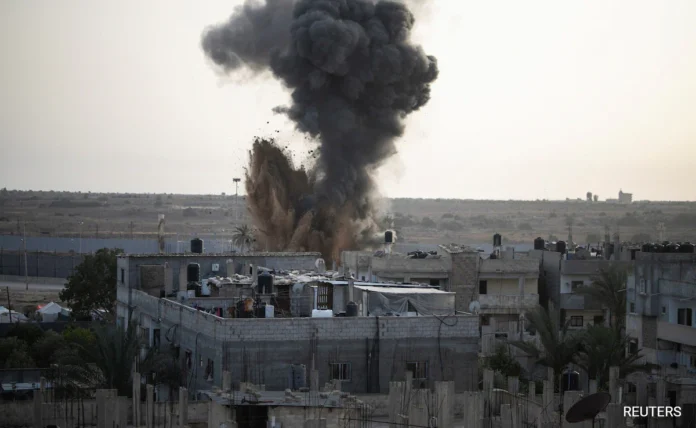Rafah, Gaza Strip — The southern Gazan city of Rafah has become the focal point of intense military operations as Israeli Defense Forces (IDF) engage in a major offensive against Hamas-affiliated targets.
Reports emerging from the conflict zone depict a scene of fierce fighting and escalating tensions.
According to Safa, a Hamas-affiliated news outlet based in Gaza, Israeli artillery and helicopters unleashed a barrage of firepower in the Saudi neighborhood west of Rafah.
The onslaught resulted in clashes and explosions reverberating throughout the city’s western districts, leaving residents in a state of panic and uncertainty.
Simultaneously, the Palestinian Authority’s state-run news agency Wafa reported that Israeli artillery strikes extended across central and eastern Rafah, further exacerbating the humanitarian crisis in the densely populated area.
The strikes have inflicted substantial damage on civilian infrastructure, compounding the already dire humanitarian situation in Gaza.
The recent escalation follows a statement by Israeli state broadcaster Kan, which indicated that Israel plans to intensify its operations in Rafah over the coming weeks.
Prime Minister Benjamin Netanyahu emphasized the strategic importance of rooting out Hamas from Rafah, underscoring the military’s resolve to tackle the militant group.
In response to the military offensive, the Qatari state-run media outlet Al Jazeera cited medical sources reporting at least 28 casualties since the onset of the raids and shelling early Friday morning.
The exact breakdown of casualties, particularly distinguishing between civilians and combatants, remains unclear amid the chaotic conditions prevailing in Rafah.
The IDF has refrained from issuing an official statement on the latest developments, maintaining a position of operational security amidst ongoing hostilities.
However, local eyewitnesses and residents have described scenes of devastation and despair, with plumes of smoke rising from the impacted areas following each bombardment.
International humanitarian organizations have raised alarms over the escalating violence, urging both sides to exercise restraint and prioritize the protection of civilian lives.
The United Nations has called for an immediate ceasefire and humanitarian access to provide relief to the affected population, emphasizing the urgent need for de-escalation and dialogue to prevent further loss of life.
As the situation in Rafah continues to unfold, fears of a humanitarian catastrophe mount, with thousands of civilians trapped in the crossfire.
The international community remains divided in its response, with calls for diplomacy and mediation competing against the backdrop of entrenched hostilities and geopolitical tensions.
The ongoing conflict underscores the enduring challenges of achieving a lasting peace in the region as both sides brace for potential escalation in the days ahead.
The repercussions of the military operations in Rafah are likely to reverberate across the wider Middle East, influencing regional dynamics and international relations for the foreseeable future.
This article was created using automation technology and was thoroughly edited and fact-checked by one of our editorial staff members

